

Swimming Naked in China. With the Chinese government tightening credit, the massive leakage from the formal banking sector into the ‘shadow system’ ultimately risks sinking the country’s financial system.
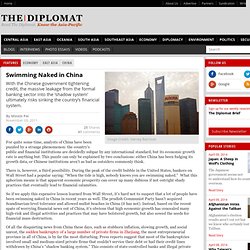
For quite some time, analysts of China have been puzzled by a strange phenomenon: the country’s public and financial institutions are decidedly subpar by any international standard, but its economic growth rate is anything but. This puzzle can only be explained by two conclusions: either China has been fudging its growth data, or Chinese institutions aren’t as bad as outsiders commonly think. There is, however, a third possibility. China's Real Estate Bubble May Have Just Popped. Snapshot Financing the Middle Kingdom's recent building boom has been expensive: Estimates put local government debt alone at between $800 billion and $2 trillion, or around 13 to 36 percent of GDP.
If the real estate bubble pops, financial and social crises will follow. Condos under construction in Guangzhou. (Photo: Slices of Light / flickr) "The Future of China’s Growth" by Justin Yifu Lin. Exit from comment view mode.
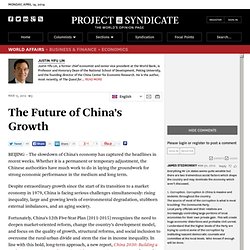
Click to hide this space. "China Adjusts" by Jeffrey Frankel. Exit from comment view mode.
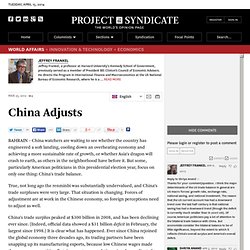
Click to hide this space BAHRAIN – China watchers are waiting to see whether the country has engineered a soft landing, cooling down an overheating economy and achieving a more sustainable rate of growth, or whether Asia’s dragon will crash to earth, as others in the neighborhood have before it. But some, particularly American politicians in this presidential election year, focus on only one thing: China’s trade balance. True, not long ago the renminbi was substantially undervalued, and China’s trade surpluses were very large. That situation is changing. China’s trade surplus peaked at $300 billion in 2008, and has been declining ever since. "China’s Stability Gambit" by Stephen S. Roach. Exit from comment view mode.
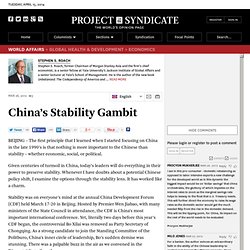
Click to hide this space BEIJING – The first principle that I learned when I started focusing on China in the late 1990’s is that nothing is more important to the Chinese than stability – whether economic, social, or political. Given centuries of turmoil in China, today’s leaders will do everything in their power to preserve stability. Whenever I have doubts about a potential Chinese policy shift, I examine the options through the stability lens. It has worked like a charm. Stability was on everyone’s mind at the annual China Development Forum (CDF) held March 17-20 in Beijing. From ‘Made in China’ to ‘Bought in China’ - Ideas. Viewpoint: China, the 'leading dragon' of the world economy.
24 November 2011Last updated at 00:30 By Justin Yifu Lin Chief economist, World Bank Justin Yifu Lin's new book is called "Demystifying the Chinese Economy" Whether we are on the verge of an "Asian Century" or not, one thing is clear: there has already been a dramatic shift in the geographic centre of the global economy.
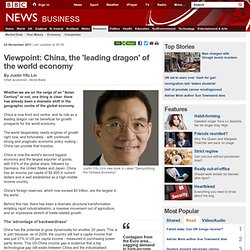
China is now front and centre, and its role as a leading dragon can be beneficial for growth prospects for the world economy. The world desperately needs engines of growth right now, and fortunately - with continued strong and pragmatic economic policy making - China can provide that impetus. "Greece-Proofing China" by Yu Yongding. Exit from comment view mode.
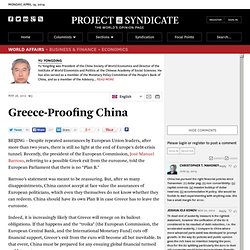
Click to hide this space BEIJING – Despite repeated assurances by European Union leaders, after more than two years, there is still no light at the end of Europe’s debt-crisis tunnel. China Credit Squeeze Prompts Suicides, Violence. Hours after a creditor and his gang of tattooed thugs hustled Zhong Maojin into a coffee shop in Wenzhou, he says he wouldn’t yield to their demands.
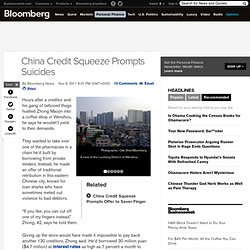
They wanted to take over one of the pharmacies in a chain he’d built by borrowing from private lenders. Instead, he made an offer of traditional retribution in this eastern Chinese city, known for loan sharks who have sometimes meted out violence to bad debtors. “If you like, you can cut off one of my fingers instead,” Zhong, 42, says he told them. Giving up the store would have made it impossible to pay back another 130 creditors, Zhong said. He’d borrowed 30 million yuan ($4.7 million) at interest rates as high as 7 percent a month to expand the business.
Another Asian Wake-Up Call - Stephen S. Roach. Exit from comment view mode.
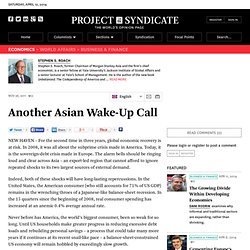
Click to hide this space NEW HAVEN – For the second time in three years, global economic recovery is at risk. Demystifying the Chinese Economy - Justin Yifu Lin. Exit from comment view mode.

Click to hide this space WASHINGTON, DC – China had an advanced and prosperous civilization for millennia until the eighteenth century, but then degenerated into a very poor country for 150 years. Now it has resurged to become the world’s most dynamic economy since launching its transition to a market economy in 1979. Asia in the Year of the Dragon - Haruhiko Kuroda. Exit from comment view mode.
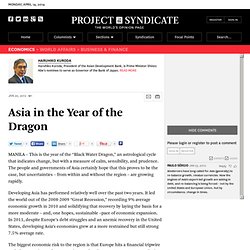
Click to hide this space MANILA – This is the year of the “Black Water Dragon,” an astrological cycle that indicates change, but with a measure of calm, sensibility, and prudence. Rattling the Renminbi - Yu Yongding. Exit from comment view mode. Click to hide this space. Why Capital Flows Uphill - Keyu Jin. Exit from comment view mode. Click to hide this space LONDON – At first, it seems difficult to grasp: global capital is flowing from poor to rich countries.
Emerging-market countries run current-account surpluses, while advanced economies have deficits. One would expect fast-growing, capital-scarce (and young) developing countries to be importing capital from the rest of world to finance consumption and investment. So, why are they sending capital to richer countries, instead? China is a case in point. The China Bears’ Feeble Growl - Yu Yongding. Exit from comment view mode. Click to hide this space BEIJING – In recent months, bearish sentiment about the Chinese economy has surged, owing largely to three conjectures. First, China’s housing market is on the brink of collapse. Second, China’s fiscal position will worsen rapidly because of massive local government debt. And, third, the collapse of underground credit networks in bustling cities such as Wenzhou will lead to a broad financial crisis across the country.
The Future of the Yuan. According to a growing chorus of pundits and economists, China -- already the world’s most prolific exporter, largest sovereign creditor, and second-largest economy -- will someday soon provide the world’s reserve currency. According to this view, just as the dollar dethroned the British pound in the interwar years, so the yuan will soon displace the dollar, striking a blow to U.S. interests. As the economist Arvind Subramanian recently wrote, the yuan “could become the premier reserve currency by the end of this decade, or early next decade.” This view has gained traction as Chinese leaders have launched a concerted effort to internationalize the yuan. During the G-20 summit in November 2008, at the height of the financial crisis, Chinese president Hu Jintao called for “a new international financial order that is fair, just, inclusive, and orderly.”
To continue reading, please log in. Is China's Economy Crumbling? On Saturday, Bloomberg reported that a joint forecast by Xiamen University and the National University of Singapore predicts Chinese economic growth will slow to 8.6 percent this year, down from 2011’s 9.2 percent announced last month by Beijing’s National Bureau of Statistics. Growth will bottom out in the second quarter of this year at 8.4 percent, according to the Xiamen-Singapore study, which is in line with consensus views. "China’s Growing Growth Risks" by Yao Yang. The Impoverished “Asian Century” - Chandran Nair. Exit from comment view mode. The End of the Con. The days of easy growth are gone, meaning the government must address problems linked to low household income and excess investment By Andy Xie China's economic management overly relies on juicing up confidence and encouraging speculation on the expectation of a brighter future.
The demand from the confidence game leads to excessive demand for debt to finance holdings of speculative assets like land and commodities. Properties under construction, sold vacant properties and the inventories of commodities like steel and non-ferrous metals may exceed 100 percent of GDP at current market value. "China’s Slow Road" by Shujie Yao.
Exit from comment view mode. Click to hide this space NOTTINGHAM – As the eurozone crisis deepens, investors worldwide are sifting through the semantics of China’s economic-policy pronouncements with increasing desperation. They seek signs of an economic “miracle”: a rerun of the RMB4 trillion ($628 billion) stimulus of 2008 that maintained impressive Chinese growth as the West slipped into recession – and shielded the global economy from a worse collapse. But rolling out another investment program on such a scale would be financial suicide for China. Investors worldwide must face an uncomfortable reality: China’s economy is slowing, and will likely continue to do so. Analysts have been quick to predict whether the China’s economic landing will be hard, soft, or bumpy. According to this measure, a soft landing indicates a short-term fall in economic growth – a fluctuation rather than a trend.
5 Signs of the Chinese Economic Apocalypse - By Trefor Moss. What Is Financial Reform in China? Premier Wen’s recent attack on the Chinese banking system last month has highlighted what was already a very interesting debate on Chinese banks and the Chinese financial system. There is a growing sense that the Chinese banking system is deeply flawed and needs to be reformed.